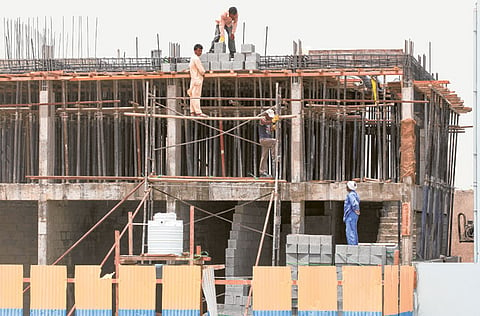Ramadan fasting: A labour of faith
For thousands of labourers, the recipe of extreme weather, tough work and fasting is all about faith

Dubai: It's only 11am, but labourers have already had a very long day in the blistering sun. They look ready to drop as they file out of hot buses returning them to their cramped rooms.
But virtually no one in the vast labour accommodation colony of Sonapur can be seen taking any refreshments as it's Ramadan and Muslims are fasting from dawn to dusk - even those toiling under the gruelling sun.
Read more Ramadan-related stories
Ramadan work hours for labourers start soon after dawn and last until noon. But there's no let up in the blistering heat and stifling humidity, and believers won't take a sip of water till it's time to end the fast at sunset.
Until then, it's a battle against hunger and thirst. The suhour meal they had before dawn quickly burns up under the day's heavy workload. And the glasses of cold water end up as streams of sweat, lost before the sun rises high.
This recipe of extreme weather, tough work and fasting is all about faith.
"How do we do it? It's about keeping faith," said Bangladeshi labourer Mohammad Suhail, when asked what keeps them going.
There are no special diets, no gorging of meals to prepare for the next day. They eat modest meals before dawn and at sundown, making sure to have lots of fruits and water for energy.
"The first few days of Ramadan are very hard, but once you've committed to it [fasting] in your heart, your body will follow," said Suhail, 25.
"No matter how much you eat or drink, you'll be hungry and thirsty within an hour again if you work like us. Eating too much before the fast slows you down and actually makes it harder to do the job," he added.
The thought of ending the fast before time doesn't cross his mind despite the odds, he said. Workers would only consider it when their health is at risk, Suhail added.
"We take a few short breaks every now and then to pace ourselves. We keep chatting to a minimum to save energy. But if you faint, or feel like you're about to pass out, then it's OK - we end the fast then."
Other workers added that fasting in such demanding situations is a test of patience and sacrifice that brings a special reward. "God makes it easier for the fasting person. If your faith is strong, you can survive anything. In fact, I feel more healthy during Ramadan," said Pakistani worker Anwar Khan, 28.
Many also said they prefer the "short and straight" Ramadan working shift over the longer split job hours enforced during the rest of the year.
Once the labourers are home, they usually take a nap for three or four hours. Late afternoons are for shopping for their daily needs or spending time with friends and colleagues.
After a modest meal at sundown, usually taken at the neighbourhood mosque, the workers go back to their shared rooms to cook suhour. Some socialising later, it's time for bed.
Tomorrow is another hard day at work.


